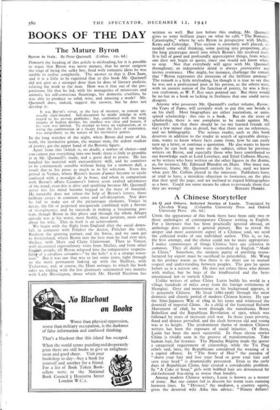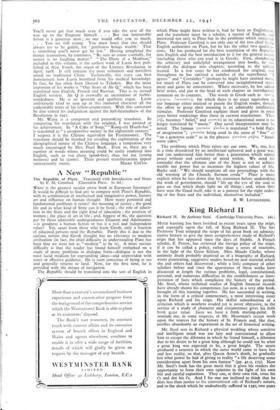A Chinese Storyteller
UNTIL the appearance of this book there have been only two or three anthologies of contemporary Chinese writing in English. For a literature that has been practically ignored abroad, an anthology does present a general picture. But to reveal the deeper and more consistent aspect of a Chinese soul, we need the collected works of one individual author. This is, so far, the first attempt, and the choice could not be more appropriate. I notice connoisseurs of things Chinese have one criterion in common. They all dislike wares earmarked in English " Made in China." Somehow, the intrinsic purity of anything manu- factured for export must be sacrificed to palatability. Mr. Wang in his preface warns us that there is no short cut to mutual respect and understanding between peoples. The gate he opens before us is a narrow one. He does not refute those who distort with malice, but he begs of the kindhearted and the best- intentioned not to varnish China.
.Unlike writers of urban China Lusin builds his world in a village hundreds of miles away from the foreign settlements of Shanghai. Grey and monotonous as his background appears, it is genuinely Chinese. He lived (1881-1936) through the most dramatic and chaotic period of modern Chinese history. He saw the Sino-Japanese War of 1894 in his teens and witnessed the downfall of imperial China. As a child of the frustrated Reform Movement of 1898, he went through the tumultuous Boxer Rebellion and the Republican Revolution of 1911, which was followed by years of incessant civil war. In those years poverty, flood and disease prevailed, and the clash between old and young was at its height. The predominant theme of modern Chinese writers has been the exposure of social injustice. Of these, Lusin has been the most successful. In these eleven stories China is vividly seen in the process of transformation. Take human hair, for instance. The Manchu Regime made the queue a categorical requirement of citizenship, while the Tai Ping rebels and, later, the Republicans considered the wearing of it a capital offence. In " The Story of Hair " the paradox of " shave your hair and lose your head or grow your hair and save your head " is dramatically presented. Even in the early days of Republican China, hair created a considerable problem. In " A Cake of Soap," girls with bobbed hair are denounced by old-fashioned Ssu-ming as worse than bandits.
Among modern Chinese writers, Lusin is known as a master of irony. But one cannot fail to discern his warm tears running between lines. In " Divorce," the mediator, a country squire, gives the deserted wife Aiku this advice: "Ninety dollars!
You'll never get that much even if you take the case all the way up to the Emperor himself. . . . But our honourable Seven is a generous man ; no one would offer you so much. . . . You are still young. You must learn that one should always try to be gentle, for ' gentleness brings wealth.' That i3 something you'll never get by law." Having completed the money transaction, he continues, " Be sure to count carefully, for money is no laughing matter." " The Diary of a Madman," included in this volume, is the earliest work of Lusin first pub- lished in New Youth, the organ of the Literary Revolution in April, 1918. It still remains the most vehement and merciless attack on traditional China. Technically, this story can best demonstrate how Lusin benefited from his medical knowledge. In fact, he has often been likened to Tchekov. But the most important of his works is " Our Story of Ah Q," which has been translated into English, French and Russian. This is its second English version. Ah Q is avowedly an incarnation of feeble- mindedness. He is an ignorant and apathetic rogue. Lusin ambitiously tried to sum up in this immortal character all the undesirable traits of his fellow-countrymen. With this caricature he also vented his indignation against the half-heartedness of the Revolution in 1911.
Mr. Wang is a competent and painstaking translator. In comparing his translation with the original, I was amazed at his achievement. In " A Cake of Soap," " Kung-chi Hsueh-hui " is translated as " a co-operative society in the eighteenth century." I suspect it is the Chinese equivalent for Freemasonry. The translator should be thanked for avoiding the exploitation of the ideographical nature of the Chinese language, a temptation very much encouraged by Mrs. Pearl Buck. Even so, there are a number of words whose meaning could be easily rendered into English, such as tsai chien (good-bye), shao nai nai (young mistress) and lai (come). Their present transliterations appear



























 Previous page
Previous page